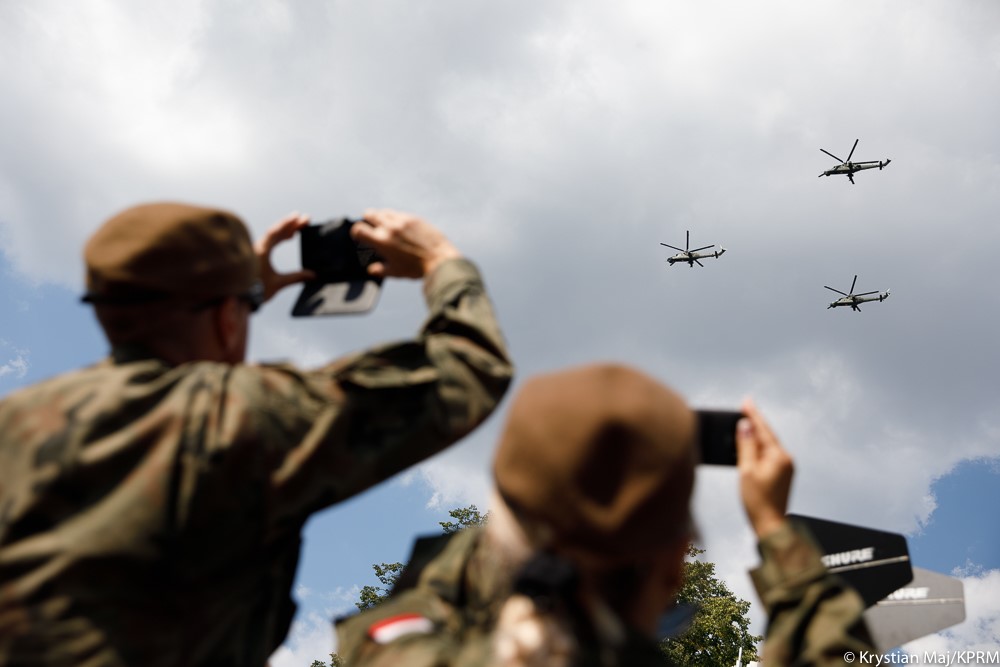Poland’s defence minister, Mariusz Błaszczak, has downplayed the severity of a data leak relating to the country’s military inventory. He assured that no secret information has been compromised and that Poland remains safe, while also criticising the opposition for its reaction to the issue.
Onet, a news website, yesterday reported that almost 1.8 million entries showing requests for arms, equipment, spare parts and specialised software submitted by various army units – which together could reportedly reveal the army’s capabilities and shortcomings – had leaked.
Polish MoD statement says this data was pulled from public procurement information that's already public… hmm. (translation via Google, don't rely on it if you're thinking of starting a war, etc) https://t.co/mYmN1tqNIn pic.twitter.com/OnQ0HirTkG
— Gareth Corfield (@GazTheJourno) January 14, 2022
According to Onet – which said it had verification from two independent sources linked with the security services – the material appeared online on 9 January and most likely originated at the Logistics Planning Headquarters of the Armed Forces Support Inspectorate in Bydgoszcz.
That headquarters oversees purchases for the army and stores equipment and spare parts. The database covered the period between June and September 2021. It also included a section on foreign-bought equipment, such as American F-16 fighters, German Leopard tanks and Israeli Spike anti-tank missiles.
The defence ministry, however, subsequently denied that the leak constituted a serious breach. Błaszczak wrote on Twitter that “no secret information has leaked out and Poland is safe”. He called on opposition politicians to “sober up” and have a “glass of cold water”.
Uspokajam, nie wyciekły żadne tajne informacje, a Polska jest bezpieczna. Politykom totalnej opozycji rekomenduję otrzeźwienie i szklankę zimnej wody. https://t.co/tkeMnRt5yd
— Mariusz Błaszczak (@mblaszczak) January 14, 2022
Speaking to the Rzeczpospolita daily earlier in the day, Cezary Tomczak, an MP from the opposition Civic Platform (PO), said his group would demand Błaszczak’s resignation over the leak.
Former prime minister Leszek Miller – who is now an opposition MEP – tweeted that “treason” seemed “too weak” a word for what had happened.
“The entire stocks of the Polish army – from underwear to F-16s, from pencis to anti-tank missiles, from food packages to dog tags – has been in the public domain for several days,” wrote Miller.
Znowu wielki sukces PiS. Cały stan posiadania Wojska Polskiego – od kalesonów do F-16, od ołówków po rakiety przeciwpancerne, od pakietów żywnościowym po nieśmiertelniki, jest od kilku dni własnością publiczną. Słowo takie jak „zdrada” wydaje się zbyt słabe.
— Leszek Miller (@LeszekMiller) January 14, 2022
On Friday morning, the defence ministry issued an initial statement saying that it was “analysing” the case to determine whether a leak had indeed taken place. “Many scenarios are taken into account, for example, that it is a test file intended for software testing,” it said.
A subsequent statement, however, clarified that the data disclosed online were “part of the Uniform Material Index kept by the Support Inspectorate,” which is the unit responsible for army purchases. It added, however, that the index “contains only publicly available information”.
“This is an incomplete catalogue of a logistic nature, containing neither information about the quantity and efficiency of the equipment nor about shortages in the stocks,” said the ministry. It said that a similar index was also published by NATO in its Master Catalogue of References for Logistics (NMCRL) online database.
The ministry said that the leak did “not pose a threat to state security or the functioning of the Polish armed forces”. It suspected an employee had “neglected duties” by making the file available on an unauthorised server.
In its report, Onet claimed that the leak did constitute a threat to Poland’s security, and that the data had been downloaded by users from “a dozen” countries, including Russia and China.
“Such data are of particular importance for the planning of offensive operations,” said General Piotr Pytel, a former head of the Military Counterintelligence Service, quoted by Onet.
Pytel said that Russia’s intelligence service was seeking such data in order to, for example, verify already obtained information as well as the credibility of informants. The latter use could therefore also be used to foil double agents working with the Polish counterintelligence.
Main image credit: Krystian Maj / KPRM (under public domain)

Maria Wilczek is deputy editor of Notes from Poland. She is a regular writer for The Times, The Economist and Al Jazeera English, and has also featured in Foreign Policy, Politico Europe, The Spectator and Gazeta Wyborcza.



















